英语之虚拟语气归纳整理
(完整版)英语虚拟语气语法归纳总结
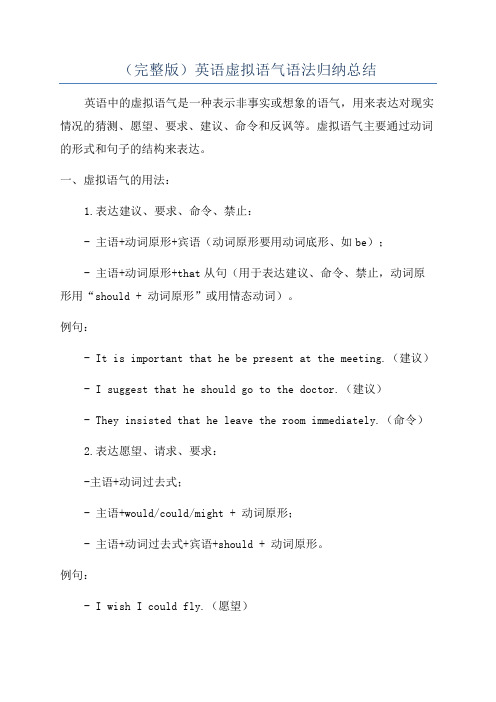
(完整版)英语虚拟语气语法归纳总结英语中的虚拟语气是一种表示非事实或想象的语气,用来表达对现实情况的猜测、愿望、要求、建议、命令和反讽等。
虚拟语气主要通过动词的形式和句子的结构来表达。
一、虚拟语气的用法:1.表达建议、要求、命令、禁止:- 主语+动词原形+宾语(动词原形要用动词底形、如be);- 主语+动词原形+that从句(用于表达建议、命令、禁止,动词原形用“should + 动词原形”或用情态动词)。
例句:- It is important that he be present at the meeting.(建议)- I suggest that he should go to the doctor.(建议)- They insisted that he leave the room immediately.(命令)2.表达愿望、请求、要求:-主语+动词过去式;- 主语+would/could/might + 动词原形;- 主语+动词过去式+宾语+should + 动词原形。
例句:- I wish I could fly.(愿望)- I would appreciate it if you could help me.(请求)3.表示虚拟条件:- If条件从句中的谓语动词用过去完成时,主句用would/should/might/could + have + 过去分词;- If条件从句中的谓语动词用过去时,主句用would/should/could + 动词原形。
例句:- If I had known his phone number, I would have called him.(虚拟条件)- If you had listened to me, we could have finished the project earlier.(虚拟条件)4.表达建议、要求、祝愿:- If only内部称述 + 主语 + 过去式。
英语虚拟语气总结

4. 名词性从句
• 凡是与advice, suggest, propose, require, insist, order, deem等表示“愿望”,“请 求”,“建议”和“命令”含义的词相关 的各种从句其虚拟语气的拟语气总结
英语中虚拟语气的变化形式主要可以分为4类: 1. 时间向前推 2. 与主句谓语动词比先后 3. 表示“为了···” 4. 名词性从句
1.时间往前推
和现在比:did/ were
1. 条件状语从句
和过去比:had done 和将来比:were to do/ should do 和现在比:did/ were
2. Wish/ if only
和过去比:had done/ could have done 和将来比:would/ could do
3. It’s time/ high time that··· did/ were
2.和主句谓动比先后
与主谓动同时:did/ were
• As if/ though
先于主谓动:had done
晚于主谓动:would/ might do
3. 表示“为了···”
• • • • • Lest 以防 For fear that 为避免 In order that 为了 In case that 以防 So that 为了
Should/ would/ might do
英语虚拟语气用法总结

英语虚拟语气用法总结1、表示与现在事实相反的情况:从句:主语+过去时主句:主语+should/would/could/might+doeg:1.If I were you,I would take an umbrella.如果我是你,我会带把伞.(事实:我不可能是你)2.If I knew his telephone number,I would tell you.如果我知道他的电话号码,我就会告诉你.(事实:不知道)2、表示与过去事实相反的情况从句:主语+had+done主句:主语+should/would/could/might+have doneeg:1. If I had got there earlier,I should/could have met her.如果我早到那儿,我就会见到她. (事实:去晚了)2.If he had taken my advice,he would not have made such a mistake.如果他听我的劝告的话,就不会犯这样的错误了.(事实:没有听我的话)3、表示对将来情况的主观推测从句:主句①if+主语+were to do :①主语+should/would/could/might+do②if+主语+did/were ②主语+should/would/could/might+do③if+主语+should+do ③主语+should/would/could/might+doeg:1.If he should come here tomorrow,I would talk to him.如果他明天来这儿的话,我就跟他谈谈.(事实:来的可能性很小)2.If there were a heavy snow next Sunday,we would not go skating.如果下周日下大雪,我们就不能去滑冰了.(事实:不知能否下雪)3.If she were to be here next Monday,I would tell her about the matter.如果她下周一来这儿的话,我就会告诉她这件事的始末.。
英语语法总结虚拟语气
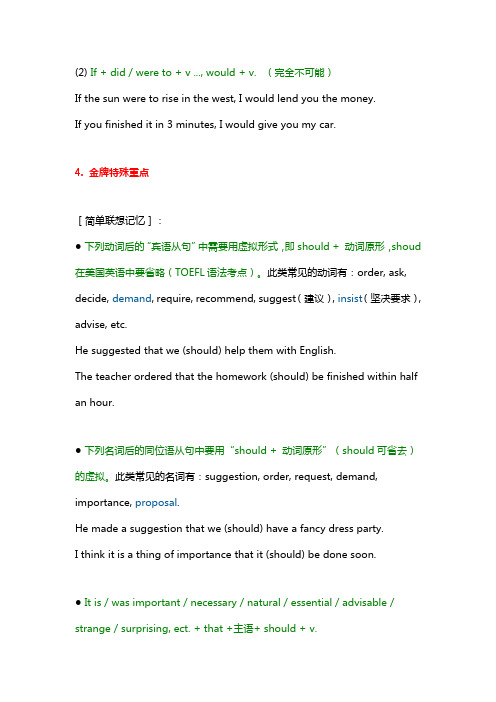
英语语法总结虚拟语气虚拟语气用来表达不可能或难以实现的愿望,与事实相反的假设,通常分为基本的三种形式。
1. 与现在事实相反的虚拟:If + did / were + ..., ... would/ should/ could/ might + do (动词原形)If I were you, I would go abroad at once. (I am not you.)If he knew it now, he could help me. (He doesn't know it now.)2. 与过去事实相反的虚拟:If + had done + ..., ... would (might) have done ...If I had known your telephone number yesterday, I would have phoned you. (I didn't know your telephone number.)If you had come here a little earlier just now, you might have met her. (You didn't come here earlier.)3. 与将来事实相反的虚拟:(1) If + should + v., ... would + v. (可能性很小)(译作“万一”)If it should rain tomorrow, you could stay at home.If I should fail, what should Ido?(2) If + did / were to + v ..., would + v. (完全不可能)If the sun were to rise in the west, I would lend you the money.If you finished it in 3 minutes, I would give you my car.4. 金牌特殊重点[简单联想记忆]:●下列动词后的“宾语从句”中需要用虚拟形式,即should + 动词原形,shoud 在美国英语中要省略(TOEFL语法考点)。
英语语法虚拟语气整理
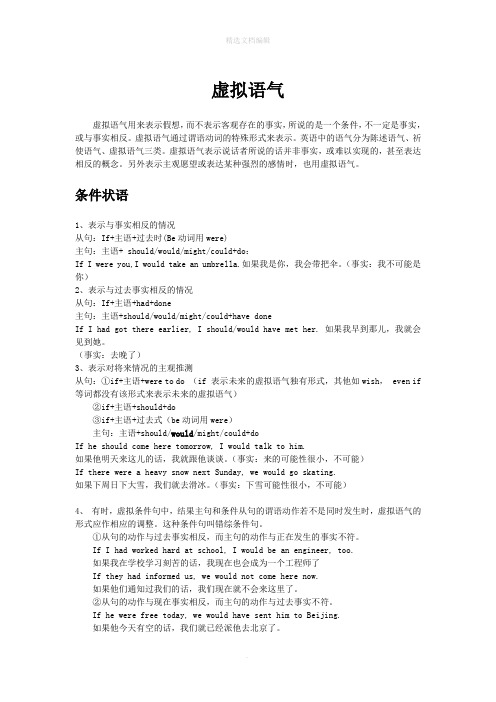
虚拟语气虚拟语气用来表示假想,而不表示客观存在的事实,所说的是一个条件,不一定是事实,或与事实相反。
虚拟语气通过谓语动词的特殊形式来表示。
英语中的语气分为陈述语气、祈使语气、虚拟语气三类。
虚拟语气表示说话者所说的话并非事实,或难以实现的,甚至表达相反的概念。
另外表示主观愿望或表达某种强烈的感情时,也用虚拟语气。
条件状语1、表示与事实相反的情况从句:If+主语+过去时(Be动词用were)主句:主语+ should/would/might/could+do:If I were you,I would take an umbrella.如果我是你,我会带把伞。
(事实:我不可能是你)2、表示与过去事实相反的情况从句:If+主语+had+done主句:主语+should/would/might/could+have doneIf I had got there earlier, I should/would have met her. 如果我早到那儿,我就会见到她。
(事实:去晚了)3、表示对将来情况的主观推测从句:①if+主语+were to do (if 表示未来的虚拟语气独有形式,其他如wish, even if 等词都没有该形式来表示未来的虚拟语气)②if+主语+should+do③if+主语+过去式(be动词用were)主句:主语+should/would/might/could+doIf he should come here tomorrow, I would talk to him.如果他明天来这儿的话,我就跟他谈谈。
(事实:来的可能性很小,不可能)If there were a heavy snow next Sunday, we would go skating.如果下周日下大雪,我们就去滑冰。
(事实:下雪可能性很小,不可能)4、有时,虚拟条件句中,结果主句和条件从句的谓语动作若不是同时发生时,虚拟语气的形式应作相应的调整。
高中英语虚拟语气(绝对全)

If my brother were here, everything would be all right. 要是我哥哥在这儿,一切都没问题虚拟语气表示所说的话只是一种主观愿望、假设或建议等。
虚拟语气的重点是:虚拟语气的特殊形式,即用来表示要求、建议、命令、提议、意愿等的主语从句、宾语从句、表语从句和同位语从句中的虚拟形式,含蓄条件句中的虚拟语气和表示愿望的虚拟形式等。
(一)虚拟语气的常见句型●与现在事实相反的虚拟语气与现在相反的虚拟语气的结构为:条件句动词为were或动词的过去式,主句为would/should/could/might+动词原形了。
If you had taken my advice,you wouldn't (couldn’t) have failed in the exam. 如果你按●与过去事实相反的虚拟语气与过去相反的虚拟语气的结构为:从句用had+过去分词,主句用would/should/could/might+have done照我的建议去做,你一定不会(不可能)考试不及格。
●与将来事实相反的虚拟语气If it were Sunday tomorrow, I should (would,could,might) go to see my grandmother. 与将来相反的虚拟语气的结构为:从句谓语动词为动词过去式或“should+动词原形”或“were to+动词原形”,主句为would/could/might +动词原形如果明天是星期天,我就(可能)去看望我奶奶。
If it were to snow this evening, they would not go out. 如果今晚下雪,他们将不出去了。
●省略if形式的虚拟语气有时条件从句中的动作和主句中的动作发生的时间不一致(表示错综时间的虚拟语气),省略连词if。
在书面语中,如果虚拟条件从句中有were,had 或should,可以把if省略,把这几个词放到主语之前,构成主谓倒装。
虚拟语气用法总结(完整)
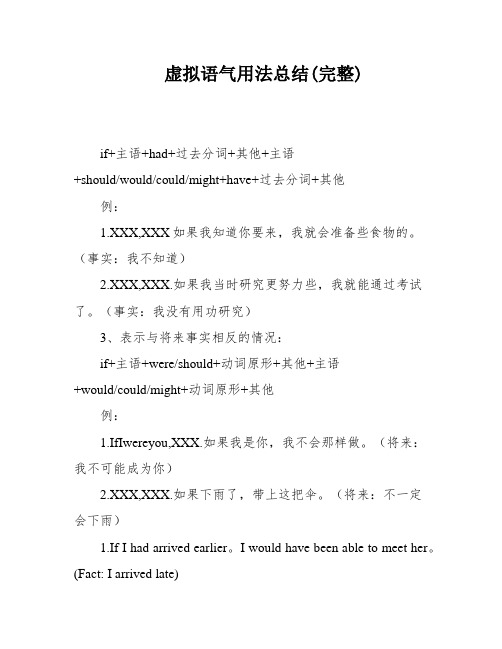
虚拟语气用法总结(完整)if+主语+had+过去分词+其他+主语+should/would/could/might+have+过去分词+其他例:1.XXX,XXX如果我知道你要来,我就会准备些食物的。
(事实:我不知道)2.XXX,XXX.如果我当时研究更努力些,我就能通过考试了。
(事实:我没有用功研究)3、表示与将来事实相反的情况:if+主语+were/should+动词原形+其他+主语+would/could/might+动词原形+其他例:1.IfIwereyou,XXX.如果我是你,我不会那样做。
(将来:我不可能成为你)2.XXX,XXX.如果下雨了,带上这把伞。
(将来:不一定会下雨)1.If I had arrived earlier。
I would have been able to meet her。
(Fact: I arrived late)2.If he had XXX my advice。
he would not have made such a mistake。
(Fact: He didn't listen to me)3.If he were to come here tomorrow。
I would talk to him。
(Fact: It's XXX he will come)In expressing ns。
orders。
requests。
etc。
the subjunctive mood is often used in the object clause。
with the verb in the form of "should + infinitive," which can be omitted.Other uses of XXX:1.The subjunctive mood is used in the object clause after "wish" to express a XXX fact。
英语《虚拟语气》语法知识总结归纳
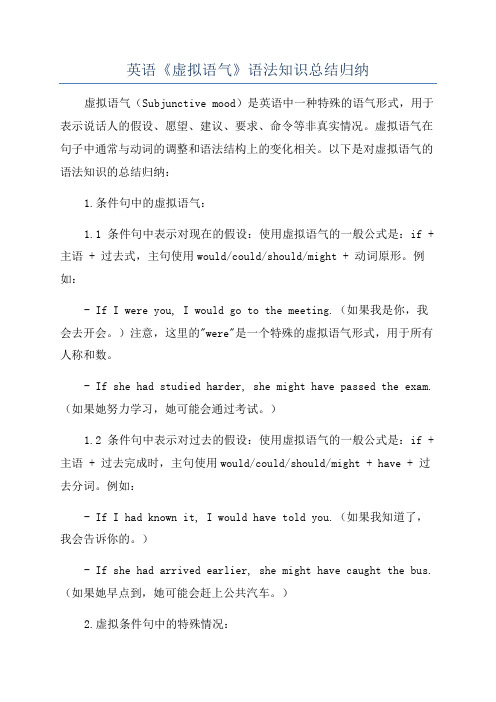
英语《虚拟语气》语法知识总结归纳虚拟语气(Subjunctive mood)是英语中一种特殊的语气形式,用于表示说话人的假设、愿望、建议、要求、命令等非真实情况。
虚拟语气在句子中通常与动词的调整和语法结构上的变化相关。
以下是对虚拟语气的语法知识的总结归纳:1.条件句中的虚拟语气:1.1 条件句中表示对现在的假设:使用虚拟语气的一般公式是:if + 主语 + 过去式,主句使用would/could/should/might + 动词原形。
例如:- If I were you, I would go to the meeting.(如果我是你,我会去开会。
)注意,这里的"were"是一个特殊的虚拟语气形式,用于所有人称和数。
- If she had studied harder, she might have passed the exam.(如果她努力学习,她可能会通过考试。
)1.2 条件句中表示对过去的假设:使用虚拟语气的一般公式是:if + 主语 + 过去完成时,主句使用would/could/should/might + have + 过去分词。
例如:- If I had known it, I would have told you.(如果我知道了,我会告诉你的。
)- If she had arrived earlier, she might have caught the bus.(如果她早点到,她可能会赶上公共汽车。
)2.虚拟条件句中的特殊情况:2.1 在虚拟条件句中表示命令、建议时,主句中的动词可以使用动词原形(而不是would/could/should/might + 动词原形)。
例如:- If you have any questions, please let me know.(如果你有任何问题,请告诉我。
)- If I were you, I would take a break.(如果我是你,我会休息一下。
- 1、下载文档前请自行甄别文档内容的完整性,平台不提供额外的编辑、内容补充、找答案等附加服务。
- 2、"仅部分预览"的文档,不可在线预览部分如存在完整性等问题,可反馈申请退款(可完整预览的文档不适用该条件!)。
- 3、如文档侵犯您的权益,请联系客服反馈,我们会尽快为您处理(人工客服工作时间:9:00-18:30)。
高考英语之虚拟语气归纳整理英语的动词有三种语气形式,即陈述语气、祈使语气和虚拟语气。
陈述语气用来说明事实或就事实提出询问,可用于陈述句、疑问句和某些感叹句中;祈使语气用于表示请求、命令、建议或警告等。
虚拟语气是谓语动词的一种特殊形式,用来表达假设、主观愿望、猜测、建议、可能或空想等非真实情况。
如:1.虚拟语气He is honest. 他很诚实。
(陈述语气)Don‘t be late next time. 下次别迟到。
(祈使语气)If I were you ,I would not go. 我要是你,我就不会去。
(虚拟语气)I wish I had a lot of money. 要是我有很多很多钱就好了。
(虚拟语气)2第一类虚拟语气在条件句中的用法:条件句有真实条件句和虚拟条件句两种。
真实条件句所表示的假设是有可能发生的,此时主句不用虚拟语气;而虚拟条件句则表示一种假想,与事实相反或不大可能会发生,此时用虚拟语气。
如:If I have time,I will go. 假若我有时间,我就去。
(陈述语气)If I were you,I would go. 假若我是你,我就去。
(虚拟语气)时态类型主句谓语形式条件句的谓语形式例句与现在事实相反would/should/could/might+ V原形动词过去式did*be 多用were1. If I were you, I shouldstudy English.2. I would certainly go ifI had time.与过去事实相反would/should/could/might +have done动词过去完成式had done1. If you had taken myadvice, you would not havefailed in the test.2. If I had left a littleearlier, I would havecaught the train.与将来事实相反would/should/could/might + V原形①动词过去式②should +V原③were + to do1.If you came tomorrow, wewould have the meeting. ①2. If it were to raintomorrow, the meetingwould be put off.③*规律总结:从句都往过去推一个时态,如:与现在相反的if从句就用过去时;与过去相反用过去完成时(即过去的过去)注:特别说明1、l would/should/could/might主句谓语中的should主要用于第一人称后;would表示结果还表示过去经常常常做某事,might表示可能性,could表示能力、允许或可能性。
比较:If you tried again ,you would succeed. 要是你再试一试,你就会成功的。
(would表结果) If you tried again, you might succeed. 要是你再试一试,你可能会成功的。
(might表可能) If you tried again ,you could succeed. 要是你再试一试,你就能成功了。
(could表能力)2、错综时间虚拟条件句即条件从句与主句所指时间不一致,如从句指过去,而主句即指的是现在或将来,此时应根据具体的语境情况,结合上面提到的三种基本类型对时态作相应的调整:If it had rained last night, the ground would be wet now. 要是昨晚下过雨的话,现在地面就会是湿的。
You would be much better now if you had taken my advice. 假若你当时听我的话,你现在就会好多了。
3、If虚拟条件句的否定(含蓄条件句)常考两个句型:If it weren’t for…和If it hadn’t been for…,其意为“若不是(有)” “要不是”。
如:If it weren’t for water, no plant could grow. 要是没有水植物就无法生长。
If it hadn’t been for your assis tance ,we wouldn’t have succeeded.=But for your assistance ,we wouldn’t have succeeded.=Without your assistance ,we wouldn’t have succeeded.如果没有你的帮助,我们不会成功的。
4、If虚拟条件句的倒装形式,即把were, had, should置于句首。
例:Were I in school again (= If I were in school again), I would work harder.如果我能再上一次学,我会学习得更努力。
Had you asked me, I would have told you. (=If you had asked me,…)如果你问我,我会告诉你。
3第二类使用虚拟语气的常见结构或从句:1.*wish与hope接宾语从句的区别在于:hope表示一般可以实现的希望,宾语从句用陈述语气。
wish表示很难或不大可能实现的希望,宾语从句用虚拟语气。
试比较:(1)We hope they will come. (We don’t know if they can come.)(2) We wish they could come. (We know they are not coming.)我们希望他们能来。
2.if only 与 I wish一样,也用于表示与事实相反的愿望,其后所虚拟语气的时态与 wish后所接时态的情况相同:If only she had had more courage! 她再勇敢一些就好了。
If only I had listened to my parents! 我要是当时听了父母的话就好了。
If only she would go with me! 她要是愿意和我一道去就好了!*if only 通常独立使用,没有主句。
3.l would rather后句子用虚拟语气只分现在和过去在would rather, would sooner, would just as soon后的that从句中, 句子谓语习惯上要用虚拟语气,表示"宁愿做什么" ,具体用法为:①一般过去时表示现在或将来的愿望I’d rather you went tomorrow (now). 我宁愿你明天(现在)去。
②用过去完成时表过去的愿望I’d rather you hadn’t said it. 我真希望你没有这样说过。
4.l as if (though)从句用虚拟语气以as if (as though)引导的方式状语从句或表语从句,有时用虚拟语气,则与wish用法相同,例:He acts as if he knew me. 他显得认识我似的。
They treat me as though I were a stranger. 他们待我如陌生人。
He talks as if he had been abroad. 他说起话来好像曾经出过国。
注:两点说明(1) 从句所表示的内容若为事实或可能为事实,也可用陈述语气:It looks as if we’ll be late. 我们似乎要迟到了。
(2) 注意It isn’t as if…的翻译:It isn’t as if he were poor. 他不像穷的样子(或他又不穷)。
4第三类从句中should+动词原形,should可省略1. 在lest ,for fear that( 以免) ,in case(以防)引导的目的状语从句中的虚拟语气She walked quietly lest she (should)wake up her roommates. 她走得很轻以免吵醒她的室友。
2. 表应当做值得做一类动词后的宾语从句建议advise, suggest, propose, recommend命令order, command请求ask, demand, require, request指示direct督促urge提议move, vote希望desire坚持insist打算intend安排arrange 例如:I insisted that he (should)stay. 我坚持要他留下。
He urged that they go to Europe. 他督促他们到欧洲去。
He suggested that we should leave early. 他建议我们早点动身。
He ordered that it (should)be sent back. 他命令把它送回去。
I ask that he leave. 我要求他走开。
He requires that I (should)appear. 他要求我出场。
I move that we accept the proposal. 我提议通过这项提案。
He arranged that I should go abroad. 他安排我去国外。
She desires that he do it. 她希望他做此事。
The general directed that the prisoners should be set free. 将军指示释放那些俘虏。
*suggest表“暗示”insist表“坚持认为”不用虚拟语气比较:He insisted that I had read his letter. 他坚持说我看过他的信。
He insisted that I should read his letter. 他坚持要我看他的信。
He suggested that we (should) stay for dinner. 他建议我们留下吃饭。
I suggested that you had a secret understanding with him. 我觉得你与他心照不宣。
3. order,suggestion,idea,plan, proposal, advice, demand等名词后的表语从句或同位语从句Our suggestion is that you( should)be the first to go.我们的建议是你应该第一个去。
